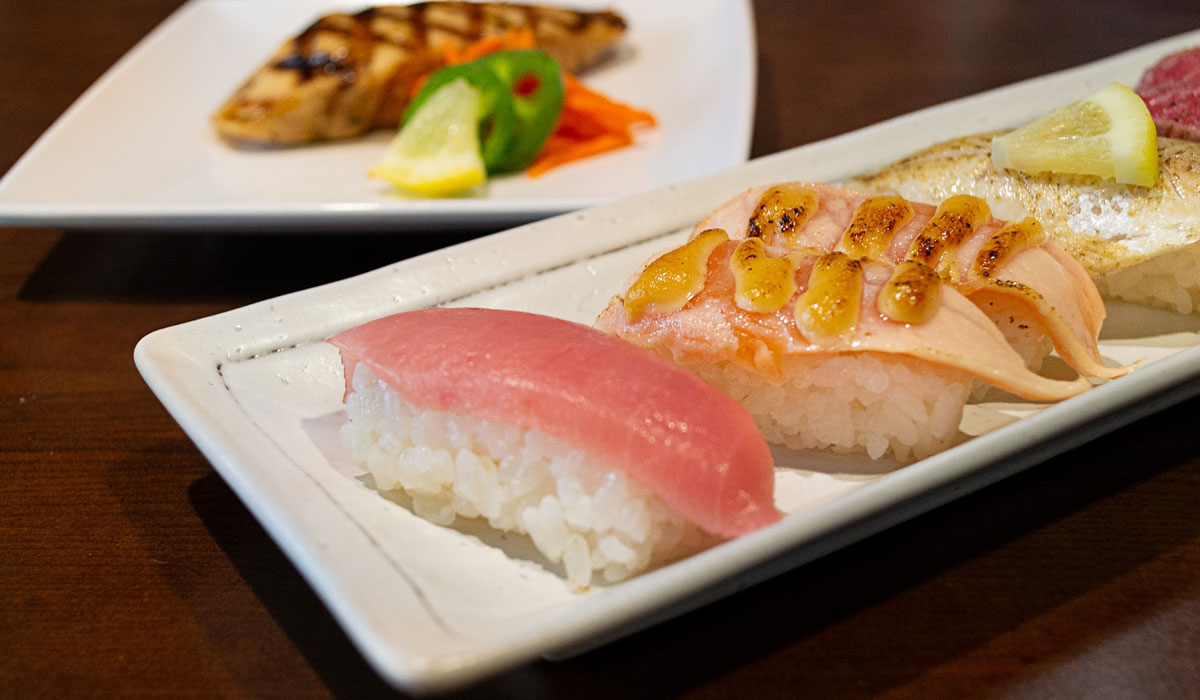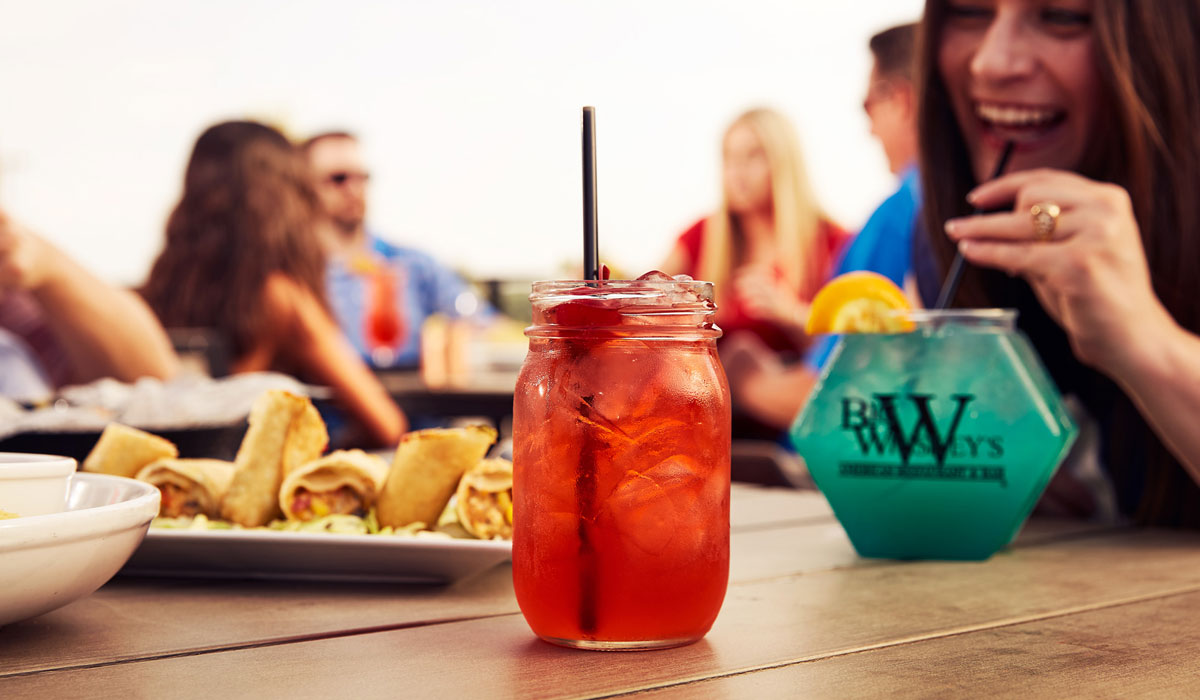











As the full-service industry enters a new decade, here are 11 restaurants prepared to make a leap in 2020.
The technology-enabled Japanese chain is coming off a successful Q1 of fiscal 2020 with year-over-year same-store sales growth of 7.9 percent. That comprises of a 3.1 percent increase in average check and 4.7 percent leap in traffic—positive news for a company that made its public debut in August. The company is built to withstand today’s tough labor market with an assembly line that transports sushi to customers and robots that assist with kitchen operations. Kura Sushi has also tested touch-panel bill ordering, enabling customers to order drinks with the swipe of a finger. The company sits at 24 units across California, Texas, Georgia, Illinois, and Nevada, but has a long-term goal of reaching 300. It’s seeking to expand by at least a half-dozen locations in fiscal 2020. Kim Ellis, a former Panda Express executive who oversaw the opening of more than 600 restaurants in five years, recently joined Kura Sushi’s board of directors to assist with that plan. The brand is controlled by Kura Sushi Japan, which has more than 400 units in Japan.
Bonchon, founded in South Korea by Jinduk Seo nearly 20 years ago, is making its mark in the U.S. The restaurant chain opened its 100th domestic location in December, one of 18 new spots in 2019. Those number correspond to a 20 percent growth rate, which the company hopes to match or exceed in 2020. The Korean fusion and double-fried chicken franchisor extends across 21 states and six countries; more than 300 units are worldwide. Bonchon was acquired by VIG Partners, a Korean–based buyout firm, at the end of 2018. The company then hired former Wingstop executive Flynn Dekker as its CEO, and he has since instituted several improvements to the supply chain, technology, marketing, and executive team. The five-year goal is to open 500 U.S. locations and 1,000 restaurants worldwide. Growing Bonchon features sauces crafted in Busan, South Korea, and cuisine like Bibimbap, Japchae, Bulgogi, and more.
Named after the gathering place where the community would meet the samurai, the full-service restaurant chain is continuing to bring a slice of Japanese cuisine to the U.S. Tomo Takahashi founded the brand in Tokyo in 2000. Ten years later, he expanded the chain to the U.S., and now there are more than 35 domestic units; another 20–plus are under development. In 2019, seven units opened across three states and Canada. As for the future, JINYA announced franchise agreements for two locations in Southern California, one in Nevada, and another two in Georgia. The company told FSR in August that it hopes to have 100 total restaurants by 2021 (including fast-casual units) and 250 by 2024. The brand is known for its 13 signature bowls, dozens of toppings, five kinds of broth simmered for 10 hours, and noodles carefully aged for three days.
What started out as a speakeasy more than 70 years ago is now on the brink of expanding past the borders of Michigan. The Detroit-style pizza brand has 16 units across the state, but there are plans to boost that total to more than 50 in the next five years. The historic restaurant is backed by CapitalSpring, a private investment firm that acquired Buddy’s Pizza in 2018. The firm has invested more than $1.5 billion in more than 60 brands and 5,000 restaurant locations, including Popeyes, Taco Bell, and Pizza Hut. Buddy’s Pizza executives said initial plans are to move into adjacent markets like Ohio or Indiana. The chain is known for its square pizza, prepared in blue steel pans originally used to hold nuts and bolts on Detroit’s automotive assembly lines. The menu also features the Antipasto salad, soups, burgers, sandwiches, and more.
The breakfast and lunch full-service chain, which began franchising locations in 2017, is in the process of building its brand in the Lone Star state. Founded in 2010 by industry veterans and friends Chris Milton and Matthew DeMott, the Toasted Yolk is scheduled to open three more spots in the Greater Houston area, which will bump its total to 14. Nine of the current 11 units opened in the past two years, a sign of rapid growth for the eatery. In addition, 17 restaurants are in development phases. There are plans to expand into new Texas markets like Dallas and San Antonio, and the company is focusing efforts to spread nationally along the Gulf Coast and Florida. Toasted Yolk prides itself on purchasing local goods and serving farm-to-table meals combined with a full slate of juices, coffee, and cocktails.
Classic 24/7 eatery Bob & Edith’s Diner is prepared to foray into the world of franchising. The 50-year-old restaurant is partnering with Fransmart, a franchise development company, to find the right franchisees to lead the chain into markets across the country, beginning with Washington, D.C., Virginia, Maryland, and North Carolina. Bob & Edith’s operates four units in Virginia, with a fifth coming in 2020. Bob and Edith Bolton bought Gary’s Donut Dinette in 1969 and switched the named to Bob & Edith’s Diner. The restaurant has transformed from a 10-stool counter, to five stools and seven booths, to what is seen in units today. The business is now in its third-generation—grandchildren Tammy and Chris Bolton manage the chain while Greg Bolton, Bob and Edith’s son, owns the brand. Retail strategist Lee Engle compares the restaurant to Five Guys Burgers & Fries, which started in the same location with a similar size and expanded to more than 1,500 locations globally.
A couple of months ago, Dallas–based Twin Peaks inked a deal with ApplePie Capital, a capital markets partner, to accelerate the growth of its brand by providing financial aid to franchisees. As part of the plan, $30 million in debt capital will be allocated to franchises. The sports lodge signed three franchise deals in 2019 and is looking to sign 10 more partners in 2020 for 40 locations. The chain has 85 restaurants in 26 states and expects to add 12 to 15 units in 2020, one of those being a store in Mexico City. Along with expansion, new menu items are being tested and redesigns are in the pipeline, including expanded indoor and outdoor bars, improved AV packages, outdoor fire pits, and more. Twin Peaks is hoping to continue the growth it witnessed in 2019 as seen by a 1.2 percent year-over-year increase in traffic.
Bottleneck Management, the parent company of City Works Eatery and Pour House, started the brand in 2016 as a way to avoid market confusion and being pigeonholed as just a bar. The nine-unit chain doubled in size in 2019, and two more are on the way in 2020—one in Disney Springs, Florida, outside Orlando, and another in Watertown, Massachusetts, near Boston. The full-service restaurant also plans to expand its menu by 20 to 25 items and add at least 20 more craft and cocktail beverages. City Works features 90 brews, and 98 percent of its menu is made from scratch. City Works is led by Illinois Wesleyan University classmates Jason Akemann, Nathan Hilding, and Chris Bisaillon. In July, the restaurant company hired Mark Gray as its first COO to help lead strategic and operational goals.
Big Whiskey’s is hitting its stride as the new year begins. Shane Miller, the first operator to open a Big Whiskey’s franchise, signed a deal toward the end of 2019 to open three more units in Northwest Arkansas. The brand, founded in downtown Springfield, Missouri, in 2006, operates in Arkansas, Kansas, and Missouri. Big Whiskey’s menu features buffalo chicken wontons, the Big Whiskey BBQ Craft Burger topped with onion rings, bacon, and homemade honey whiskey barbecue sauce, hand-cut steaks, and homemade pasta. Miller opened the first franchise in Bentonville, Arkansas, in 2017, and has seen consistent sales data since then. The upward trending numbers are what pushed him to sign on for more franchise opportunities. There are also plans for the chain to open in new markets Tulsa, Oklahoma, and Birmingham, Alabama, and add a third Big Whiskey’s in the Kansas City, Missouri, area.
The restaurant chain is in the process of creating a solid foundation to promote future growth. In November, the brand decided to expand its reach in the Dallas/Forth Worth area by signing a four-unit development agreement with entrepreneurs Harry Singh and Jesse Thind. In the next decade, the franchisor hopes to partner with franchisees to open about 40 locations in the suburbs of San Antonio, Houston, and Dallas-Fort Worth. Boston’s Pizza is also temporarily revamping its menu to begin the year. Trying to capitalize on the consumer trend toward healthier eating, the restaurant rolled out “New Year, New Me” lifestyle-inspired items that included keto, paleo, and plant-based foods, along with alcohol-free mocktails. Each will be available through March 29. Boston’s has 20 stores and has been in operation for more than 50 years. The company’s Canadian counterpart has more than 400 stores and Boston’s as a whole pushes total systemwide sales north of $1 billion, including Mexico restaurants.
True Food Kitchen is beginning 2020 with a bang by opening a location on the Las Vegas Strip on February 12. This will coincide with the brand’s first True Bar, a standalone scratch-bar concept featuring juices, organic teas, and natural refreshers. The 1,800-square-foot bar will sit adjacent to the restaurant and will seat up to 66 customers and up to 94 for a reception. True Food Kitchen offers a rotating list of items based on the season. The food is inspired by co-founder Dr. Andrew Weil’s anti-inflammatory food pyramid. The full-service chain operates 32 locations, including the first Las Vegas spot that opened in October and a second Chicagoland unit that opened in November. It also helps that Oprah Winfrey is one of the chain’s investors. CEO Christine Barone told CNBC in July 2018 that Winfrey’s investment will double the restaurant’s business in the next three years. One and a half years later, the concept has increased by 11 units.








